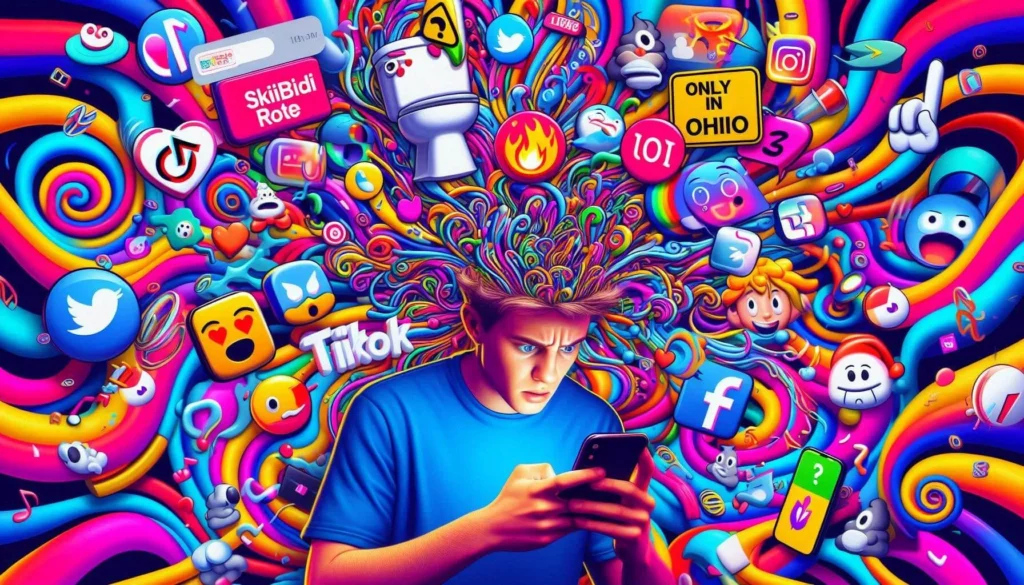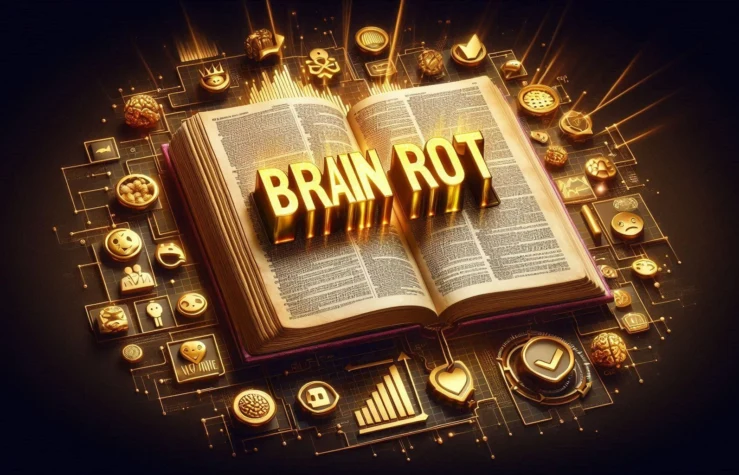In a monumental public vote involving over 37,000 participants, the Oxford Word of the Year 2024 has been officially declared as ‘brain rot’. This phrase resonates deeply with societal concerns, reflecting the increasing influence of internet culture and the impact of excessive digital consumption.
The Selection Process: Why ‘Brain Rot’ Stands Out
Oxford Languages followed a meticulous process to select the Word of the Year. Their expert panel shortlisted six terms that captured the essence of the past year’s conversations and cultural moments. After two weeks of public voting, alongside in-depth discussions and language data analysis, the term ‘brain rot’ emerged as the definitive winner.
Understanding ‘Brain Rot’
Described as the “decline in an individual’s cognitive or intellectual abilities stemming from excessive exposure to superficial or mindless content—especially in the digital realm,” the term ‘brain rot’ encapsulates the growing anxieties surrounding the impact of online overconsumption.
This term’s prominence has surged in 2024, with usage increasing by a staggering 230% compared to the previous year. Its relevance extends beyond the internet and reflects societal anxieties about how technology shapes cognition and culture.
Tracing the Origins of ‘Brain Rot‘
The phrase ‘brain rot’ isn’t a 21st-century invention. In 1854, Henry David Thoreau used it for the first time in Walden. Thoreau used the term metaphorically to criticize societal tendencies to oversimplify complex ideas, leading to intellectual stagnation.
“While England endeavors to cure the potato rot, will not any endeavor to cure the brain-rot – which prevails so much more widely and fatally?” – Henry David Thoreau
Even in Thoreau’s era, the concept of mental stagnation resonated as a critique of diminishing intellectual engagement. Fast-forward to 2024, the term has found new life in the digital age, embodying the perils of excessive exposure to low-value online content.
‘Brain Rot’ in the Digital Age
The term ‘brain rot’ first gained traction on social media platforms like TikTok, predominantly among Gen Z and Gen Alpha. Initially used in a humorous or self-deprecating manner, it described the effects of consuming absurd or nonsensical online content.

Key Online Phenomena Associated with ‘Brain Rot’
Several internet trends and memes contributed to the popularization of the term:
- Skibidi Toilet Series: A viral video series by creator Alexey Gerasimov featuring humanoid toilets became emblematic of bizarre and seemingly meaningless content.
- ‘Only in Ohio’ Memes: This internet joke, referencing bizarre or absurd incidents in the state of Ohio, further exemplifies the lighthearted yet intellectually trivial nature of content dubbed as ‘brain rot’.
- Emerging ‘Brain Rot’ Language: New slang terms like ‘skibidi’ (nonsensical) and ‘Ohio’ (embarrassing or weird) highlight how online culture generates a distinct vernacular. These words, initially confined to digital communities, are now seeping into everyday conversations, showcasing the blending of virtual and real-world language.
The Serious Side of ‘Brain Rot‘
While often humorous, the term also underscores deeper societal concerns. Psychologists, educators, and parents are increasingly worried about the mental health implications of excessive digital consumption, particularly among children and adolescents.
Mental Health Impacts
- Prolonged exposure to low-quality content has been linked to reduced attention spans, increased anxiety, and a decline in critical thinking skills.
- Earlier this year, a US mental health center published guidelines on recognizing and mitigating the effects of ‘brain rot’, emphasizing the need for balance in screen time.
Why ‘Brain Rot’ Became Word of the Year
The decision to crown ‘brain rot’ as the Oxford Word of the Year reflects the term’s cultural and linguistic significance.
Symbolizing Internet Culture
According to Casper Grathwohl, President of Oxford Languages, the term embodies the growing societal concern about the balance between virtual and real-world engagement. It follows last year’s Word of the Year, ‘rizz’, which highlighted the playful, evolving nature of online language.
“Looking back at the Oxford Word of the Year over the past two decades, you can see society’s growing preoccupation with how our virtual lives are evolving. ‘Brain rot’ speaks to one of the perceived dangers of virtual life and how we are using our free time.”
Self-Awareness Among Younger Generations
Interestingly, the communities most associated with creating and consuming online content—Gen Z and Gen Alpha—are also the ones popularizing the term. This reflects a growing self-awareness among younger generations about the potential downsides of their digital habits.
Broader Implications for Society
The adoption of ‘brain rot’ as the Word of the Year goes beyond mere linguistics. It offers an opportunity to reflect on broader societal trends:
- Digital Literacy and Responsibility: As online content becomes increasingly pervasive, cultivating critical digital literacy skills is essential. Individuals must learn to discern between high-quality and low-value content.
- Impact on Education: Educators and policymakers are now tasked with addressing the influence of digital culture on learning. Strategies to integrate meaningful content consumption into education systems are crucial.
- Technology and Well-Being: The rise of terms like ‘brain rot’ highlights the need for tech companies to prioritize user well-being. Initiatives such as screen-time tracking and content moderation can play a role in mitigating negative impacts.
What Does the Future Hold?

The declaration of ‘brain rot’ as the Oxford Word of the Year for 2024 raises critical questions about our relationship with technology and the internet:
- How can we strike a balance between enjoying online culture and maintaining intellectual growth?
- Will terms like ‘brain rot’ prompt meaningful conversations about mental health and digital responsibility?
As we move forward, the term serves as a reminder to reflect on how we engage with the digital world and the lasting effects it may have on society.
Conclusion
The Oxford Word of the Year for 2024, ‘brain rot’, is more than just a phrase. It encapsulates a growing cultural dialogue about the influence of digital content on our lives. From its historical roots in Thoreau’s critique to its modern-day association with TikTok trends, the term underscores the profound impact of the internet on language, culture, and mental health.
As we navigate the complexities of the digital age, ‘brain rot’ invites us to pause and evaluate the quality of the content we consume—and its implications for our intellectual and emotional well-being. It’s a fitting testament to the power of language to reflect and shape our world.











